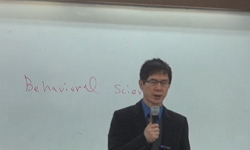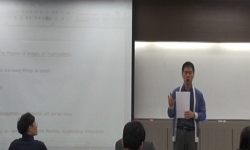본 연구는 식물원 방문객의 효과적인 관리를 위해 그들의 생태의식과 욕구구조의 연관성 규명을 목적으로 시작하였다. 이를 위해 ‘식물원 이용자의 생태의식과 이용동기수준의 파악’, ‘...
http://chineseinput.net/에서 pinyin(병음)방식으로 중국어를 변환할 수 있습니다.
변환된 중국어를 복사하여 사용하시면 됩니다.
- 中文 을 입력하시려면 zhongwen을 입력하시고 space를누르시면됩니다.
- 北京 을 입력하시려면 beijing을 입력하시고 space를 누르시면 됩니다.

식물원 이용객의 생태의식과 이용동기에 관한 연구 = A Study on the Botanical Garden Visitors` Eco-consciousness and Motivation
한글로보기https://www.riss.kr/link?id=A99999400
- 저자
- 발행기관
- 학술지명
- 권호사항
-
발행연도
2014
-
작성언어
Korean
-
주제어
생태적 패러다임 ; 태도 ; 행태 ; 심미적 욕구 ; 인지적 욕구 ; NEW ECOLOGICAL PARADIGM ; NEP ; ATTITUDE ; BEHAVIOR ; AESTHETIC NEEDS ; COGNITIVE NEEDS
-
등재정보
KCI등재
-
자료형태
학술저널
- 발행기관 URL
-
수록면
235-246(12쪽)
-
KCI 피인용횟수
1
- 제공처
-
0
상세조회 -
0
다운로드
부가정보
국문 초록 (Abstract)
본 연구는 식물원 방문객의 효과적인 관리를 위해 그들의 생태의식과 욕구구조의 연관성 규명을 목적으로 시작하였다. 이를 위해 ‘식물원 이용자의 생태의식과 이용동기수준의 파악’, ‘이용자의 인구통계학적 특성이 생태의식에 미치는 효과’, ‘생태의식과 이용동기와의 연관성 규명’을 연구문제로 설정하였다. 실증분석은 경기도 일원 3개 식물원 방문객 대상의 설문조사로 진행하였다. 이용객의 생태의식은 던랩(Dunlap)의 15개 NEP 척도로 측정하였고, 이용동기는 매슬로우(Maslow)의 7단계 욕구를 활용했다. 3개 조사대상지에서 3일간 조사한 끝에 각 360부의 설문지를 확보하여 본 분석에 사용하였다. 연구 결과, 이용객들의 생태의식과 이용동기는 보통 이상의 높은 수준이었다. 생태의식에서는 ‘자연균형과 생태위기’와 ‘반인간 중심주의’에 대한 반응이 높았다. 이용동기에서는 ‘인지적 욕구’가 가장 높았고, 그 다음은 ‘애정 및 소속의 욕구’, ‘생리적 욕구’의 순이었다. ‘자아실현 욕구’와 ‘자존의 욕구’는 가장 낮았으며, 이 둘을 제외하면 대체로 상위욕구의 비중이 높은 반응을 보였다. 생태의식과 이용동기는 상관성 분석 결과, 부(-)적 상관과 정(+)적 상관이 섞여 있었으나, 정적 상관의 비율이 70% 이상으로 높았다. 분석결과 생태의식과 이용동기는 대체로 낮은 수준의 정적 상관관계 중심으로 형성되어 있다고 볼 수 있다. 특히 ‘생리적 욕구’와 ‘인지적 욕구’가 생태의식과 상관성이 높았는데 이는 이 두 욕구가 각각 식물원 방문객의 하위욕구와 상위욕구를 대표하는 욕구로 판단된다. 즉, 식물원 방문객이 학습목적성이 강하지만, 이와 동시에 신체적인 휴식공간으로서의 기대감 또한 적지 않음을 알 수 있다. 연구 결과, 식물원 방문객의 생태의식은 보통 이상의 높은 수준인데, 향후 지속적인 증가가 예상되었다. 따라서 이용동기 또한 계속 높아질 것이며, 특히 ‘심미적 욕구’와 ‘인지적 욕구’가 커질 것으로 예상된다. 따라서, 식물원의 시각적 자원을 활용한 경관관리가 중요함을 알 수 있다. 아울러 방문객의 지적 욕구를 채워줄 수 있는 컨텐츠가 지속적으로 제공되어야 할 것으로 판단된다.
다국어 초록 (Multilingual Abstract)
The purpose of this study was to determine the correlation between botanical garden visitors`` ecological consciousness and their needs, in order to provide some effective measures to manage them. For this purpose, 3 study points were set up: "botanic...
The purpose of this study was to determine the correlation between botanical garden visitors`` ecological consciousness and their needs, in order to provide some effective measures to manage them. For this purpose, 3 study points were set up: "botanical garden visitors`` ecological consciousness and their needs", "differences of such consciousness depending on their demographic variables" and the "relationship between such consciousness and their needs". To this end, Botanical garden visitors were surveyed for an empirical analysis. The visitors`` awareness about ecology was measured with Dunlap``s 15-item NEP Inventory, while their needs were analyzed in reference to Maslow``s 7-Step Human Desire Ladder. The survey was conducted at Botanical garden for 3 days. As a result, a total of 360 questionnaires were returned. The results of this study can be summarized as follows; First, the visitors`` ecological consciousness and their needs were higher than normal level. In terms of their consciousness of ecology, their awareness of the ecological crisis potential and anti-humanism were the highest. In terms of their needs, the aesthetic need was the highest, followed by the cognitive need. On the other hand, the needs for self-achievement and self-esteem were the lowest; except them, the higher the needs were positioned at Maslow``s ladder of desire, the more responsive the subjects became. As a result of analyzing the correlation between the subjects`` consciousness of ecology and their needs, it was found that the correlation was negative in some sub-areas, while being positive in other sub-areas. After all, the ratio of the sub-areas having a positive correlation was 3 times higher than that of the sub-areas having a negative correlation. Even as for the correlation coefficient values, they were higher in the positive sub-areas, which suggests that the correlation between wetland visitors`` ecological consciousness and their needs was positive, although at a lower level, in overall terms. As a result of comparatively analyzing visitors`` needs by dividing them into 3 sub-groups depending on the levels of their ecological consciousness, it was found that the higher their consciousness of ecology was, the higher their needs were. Overall, botanical garden visitors`` ecological awareness was higher than the normal level, and it was estimated that such awareness would continue to increase. Hence, it could be inferred that their needs, particularly their aesthetic and cognitive ones, would also continue to increase. Accordingly, it is important to manage the wetland landscape making use of its visual resources, while keep providing the visitors with the contents fulfilling their need for knowledge.
참고문헌 (Reference)
1 문창현, "전주수목원 생태관광객의 방문동기 유형별 만족도 조사" 한국인간식물환경학회 12 (12): 49-59, 2009
2 유미나, "생태민감지역 트레일 방문동기별 지각된 제약요인과 충성도 차이 - DMZ 평화누리길 방문객을 대상으로 -" 한국조경학회 40 (40): 57-68, 2012
3 Henry D. Thoreau, "Walden"
4 Dunlap, R.E., "The new environmental paradigm" 9 : 10-19, 1978
5 Mill. R., "The Tourism System: An Introductory Test" Prentice-Hall International Editions 440-, 1985
6 Club of Rome, "The Limit to Growth"
7 Kim, J. I., "Studies on Operation and Visitor’s Satisfaction of Arboretum in Korea" Gyeongsang National Univ 2011
8 Kim, S.Y., "Studies of the use state and activation plan for Daegu Arboretum" 211-218, 2003
9 Ku, D.W., "Sociology of Environmental Movement in Korea" Moonji Publishing 425-, 1996
10 Carson, R., "Silent Spring" Houghton Mifflin 386-, 1962
1 문창현, "전주수목원 생태관광객의 방문동기 유형별 만족도 조사" 한국인간식물환경학회 12 (12): 49-59, 2009
2 유미나, "생태민감지역 트레일 방문동기별 지각된 제약요인과 충성도 차이 - DMZ 평화누리길 방문객을 대상으로 -" 한국조경학회 40 (40): 57-68, 2012
3 Henry D. Thoreau, "Walden"
4 Dunlap, R.E., "The new environmental paradigm" 9 : 10-19, 1978
5 Mill. R., "The Tourism System: An Introductory Test" Prentice-Hall International Editions 440-, 1985
6 Club of Rome, "The Limit to Growth"
7 Kim, J. I., "Studies on Operation and Visitor’s Satisfaction of Arboretum in Korea" Gyeongsang National Univ 2011
8 Kim, S.Y., "Studies of the use state and activation plan for Daegu Arboretum" 211-218, 2003
9 Ku, D.W., "Sociology of Environmental Movement in Korea" Moonji Publishing 425-, 1996
10 Carson, R., "Silent Spring" Houghton Mifflin 386-, 1962
11 Maloney, M. P., "Psychology in action: A revised scale for the measurement of ecological attitudes and knowledge" 30 : 787-790, 1975
12 Maslow, A.H., "New instruction: Religions, values and peak-experience" 2 : 83-90, 1970
13 Maslow, A. H., "Motivation and Personality" Harper and Row 236-, 1954
14 Kollmuss, A., "Mind the Gap: Why do people act environmentally and what are the barriers to pro-environmental behavior?" 8 (8): 239-260, 2002
15 Dunlap, R. E., "Measuring endorsement of the new ecological paradigm: a revised NEP scale" 56 : 425-442, 2000
16 Kim, S. Y., "Landscape Design for Anmyondo Botanical Garden" Seoul National Univ 2000
17 Dunlap, R.E., "Handbook of Environmental Sociology" Greenwood Press 482-524, 2003
18 Kweon, M. H., "Evaluation on Satisfactory Use of Botanic Gardens and Arboretums, and Functionality" Sangmyung Univ 2008
19 Lim, Y. J., "Evaluation of visitors service quality in Korea National Arboretum" 9 (9): 21-27, 2005
20 Weigel, R., "Environmental concern: the development of a measure" 10 : 3-15, 1978
21 Fransson, N., "Environmental concern: conceptual definitions, measurement methods, and research findings" 19 : 369-382, 1999
22 Lim, S. J., "Encyclopedia of Philosophy" Joongwon Munhwa 1128-, 2009
23 Maloney, M.P., "Ecology: Let's hear it from the people. An objective scale for measurement of ecological attitudes and knowledge" 28 : 583-586, 1973
24 Schiffman, L.G., "Consumer Behavior" Prentice-Hall 724-, 1987
25 Neisser, U., "Cognitive Psychology" Apple Country Crofts 351-, 1967
26 Lim, Y. J., "An analysis of visitors` motivation and satisfaction by visitors' experience in Korea National Arboretum" 47-55, 2008
27 Noh, H. K., "A study on the post-occupancy evaluation of arboretum in city" 37 (37): 27-35, 2010
28 Noh, Y.H., "A study on the ecotourists’ satisfaction and behavioral reaction the 58th TOSOK Symposium" 91-100, 2005
29 Kim, B. D., "A Study on the Management of Arboretum in Korea" Yeungnam Univ 2000
30 Kang, S. K., "A Study on the Classification and Management Measures of Arboreta in Korea" Kyungpook Univ 2012
31 Jeong, J. M., "A Study on the Botanical Garden Visitor's Eco-consciousness, Motivation and Preference" Cheongju Univ 2014
동일학술지(권/호) 다른 논문
-
도시공원 식재유형별 탄소저장량, 연간 탄소흡수량 및 토양호흡량 비교 -천안시 두정공원을 중심으로-
- 한국환경생태학회
- 한미경 ( Mi Kyoung Han )
- 2014
- KCI등재
-
강원도 원주시 공원녹지의 식재 수종 및 식재밀도 특성 연구
- 한국환경생태학회
- 한봉호 ( Bong Ho Han )
- 2014
- KCI등재
-
- 한국환경생태학회
- 배관호 ( Kwan Ho Bae )
- 2014
- KCI등재
-
한국의 REDD+ 프로그램 이행 적지 분석 및 활성화 방안 연구
- 한국환경생태학회
- 박홍철 ( Hong Chul Park )
- 2014
- KCI등재
분석정보
인용정보 인용지수 설명보기
학술지 이력
| 연월일 | 이력구분 | 이력상세 | 등재구분 |
|---|---|---|---|
| 2026 | 평가예정 | 재인증평가 신청대상 (재인증) | |
| 2020-01-01 | 평가 | 등재학술지 유지 (재인증) |  |
| 2017-01-01 | 평가 | 등재학술지 유지 (계속평가) |  |
| 2013-01-01 | 평가 | 등재학술지 유지 (등재유지) |  |
| 2010-01-01 | 평가 | 등재학술지 유지 (등재유지) |  |
| 2008-01-01 | 평가 | 등재학술지 유지 (등재유지) |  |
| 2005-01-01 | 평가 | 등재학술지 선정 (등재후보2차) |  |
| 2004-01-01 | 평가 | 등재후보 1차 PASS (등재후보1차) |  |
| 2003-01-01 | 평가 | 등재후보학술지 유지 (등재후보1차) |  |
| 2002-01-01 | 평가 | 등재후보학술지 유지 (등재후보1차) |  |
| 2000-07-01 | 평가 | 등재후보학술지 선정 (신규평가) |  |
학술지 인용정보
| 기준연도 | WOS-KCI 통합IF(2년) | KCIF(2년) | KCIF(3년) |
|---|---|---|---|
| 2016 | 0.61 | 0.61 | 0.64 |
| KCIF(4년) | KCIF(5년) | 중심성지수(3년) | 즉시성지수 |
| 0.66 | 0.68 | 0.773 | 0.19 |





 ScienceON
ScienceON 코리아스칼라
코리아스칼라






